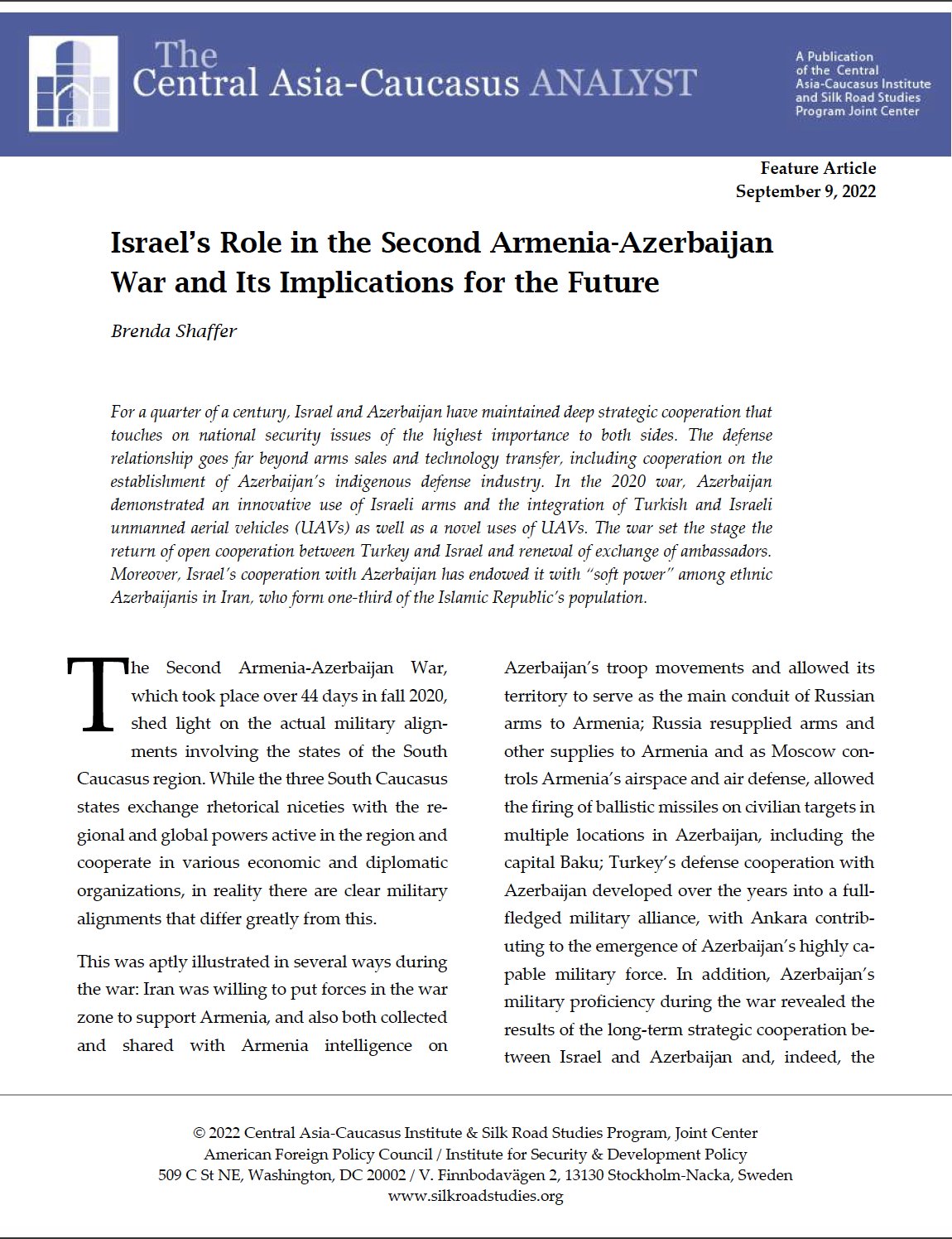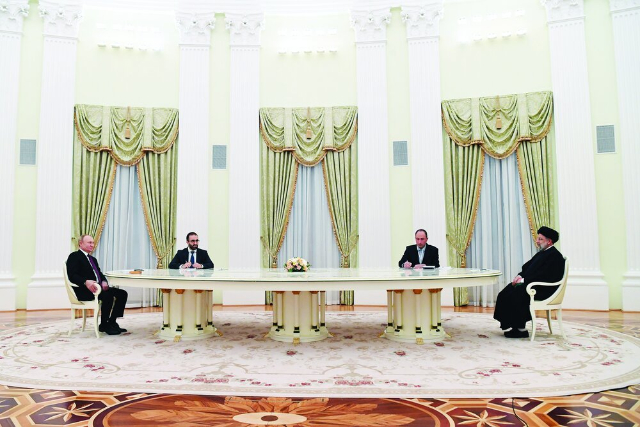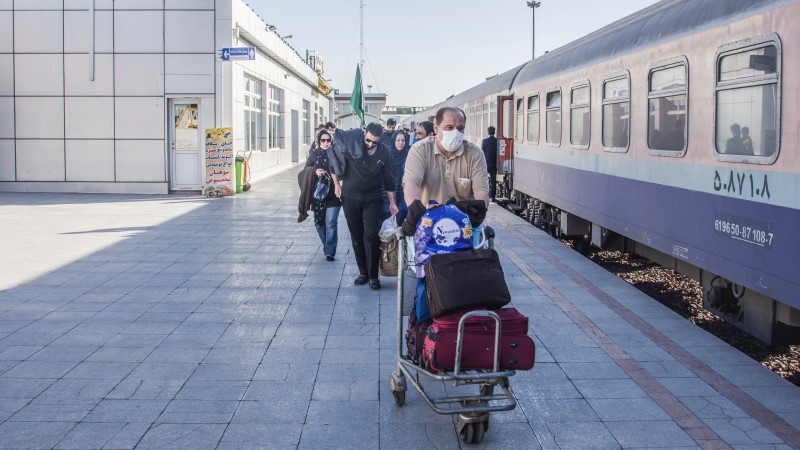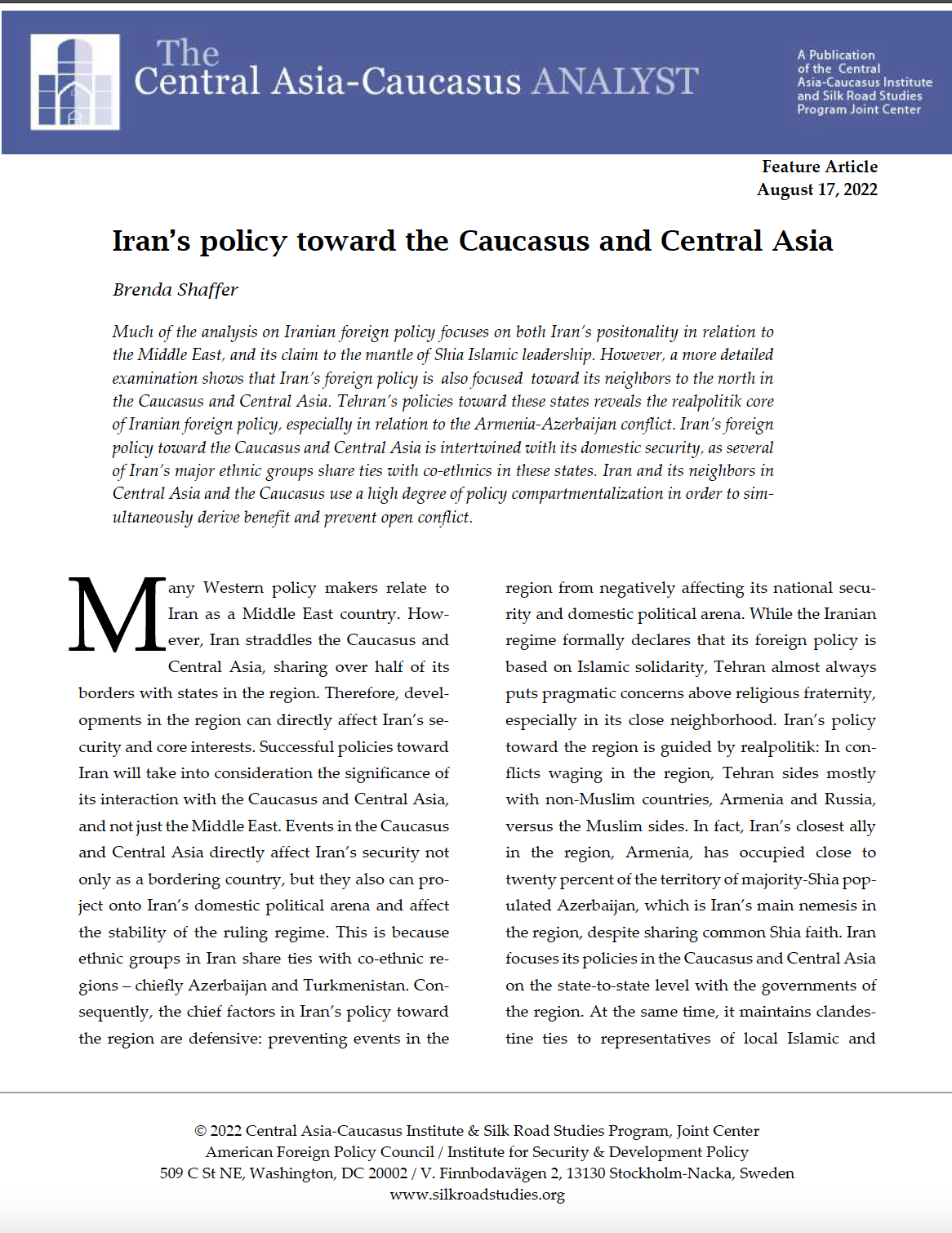Israel’s Role in the Second Armenia-Azerbaijan War and Its Implications for the Future
By Brenda Shaffer
September 9, 2022
 For a quarter of a century, Israel and Azerbaijan have maintained deep strategic cooperation that touches on national security issues of the highest importance to both sides. The defense relationship goes far beyond arms sales and technology transfer, including cooperation on the establishment of Azerbaijan’s indigenous defense industry. In the 2020 war, Azerbaijan demonstrated an innovative use of Israeli arms and the integration of Turkish and Israeli unmanned aerial vehicles (UAVs) as well as a novel uses of UAVs. The war set the stage the return of open cooperation between Turkey and Israel and renewal of exchange of ambassadors. Moreover, Israel’s cooperation with Azerbaijan has endowed it with “soft power” among ethnic Azerbaijanis in Iran, who form one-third of the Islamic Republic’s population.
For a quarter of a century, Israel and Azerbaijan have maintained deep strategic cooperation that touches on national security issues of the highest importance to both sides. The defense relationship goes far beyond arms sales and technology transfer, including cooperation on the establishment of Azerbaijan’s indigenous defense industry. In the 2020 war, Azerbaijan demonstrated an innovative use of Israeli arms and the integration of Turkish and Israeli unmanned aerial vehicles (UAVs) as well as a novel uses of UAVs. The war set the stage the return of open cooperation between Turkey and Israel and renewal of exchange of ambassadors. Moreover, Israel’s cooperation with Azerbaijan has endowed it with “soft power” among ethnic Azerbaijanis in Iran, who form one-third of the Islamic Republic’s population.
Iran’s policy toward the Caucasus and Central Asia
By Brenda Shaffer
August 17, 2022
Much of the analysis on Iranian foreign policy focuses on both Iran’s positonality in relation to the Middle East, and its claim to the mantle of Shia Islamic leadership. However, a more detailed examination shows that Iran’s foreign policy is also focused toward its neighbors to the north in the Caucasus and Central Asia. Tehran’s policies toward these states reveals the realpolitik core of Iranian foreign policy, especially in relation to the Armenia-Azerbaijan conflict. Iran’s foreign policy toward the Caucasus and Central Asia is intertwined with its domestic security, as several of Iran’s major ethnic groups share ties with co-ethnics in these states. Iran and its neighbors in Central Asia and the Caucasus use a high degree of policy compartmentalization in order to simultaneously derive benefit and prevent open conflict.
Iran and the Ukraine Crisis: Complexities and Considerations
By Vali Kaleji
April 25, 2022
Iran’s close relations with the Russian Federation, along with Tehran’s efforts to maintain relations with Ukraine, have complicated Iran’s approach to Russia’s military invasion of Ukraine. Although Iran has not recognized the independence of the so-called Donetsk and Luhansk People’s Republics, it simultaneously has not criticized the attack and abstained from voting on a UN General Assembly resolution condemning Russia’s invasion of Ukraine. While Tehran, like Russia, opposes NATO enlargement, it is concerned over possible negative implications of the war for the talks on Iran’s nuclear program.

The prospect of six-party regional cooperation in the South Caucasus
By Fuad Shahbazov
January 26, 2022, the CACI Analyst
On October 6, 2021, Russia’s Minister of Foreign Affairs Sergei Lavrov met his Iranian counterpart Hossein Amir Abdollahian in Moscow to discuss regional security and economic cooperation, and to address important concerns regarding the crisis in the South Caucasus. During the joint press conference, Lavrov repeatedly highlighted the idea of a “3+3 cooperation format” including the three South Caucasus states – Armenia, Azerbaijan, and Georgia – plus their three large neighbors, Russia, Turkey, and Iran, to focus on unlocking economic and transport communications in the region. The first meeting within the format took place in Moscow on December 2021; however, Georgia refused to take part. Moreover, recent tensions in the region between Armenia and Azerbaijan as well as Azerbaijan and Iran suggest that the proposed format will not generate visible positive outcomes.

Iran and South Caucasus Railway Connections after the Nagorno-Karabakh War
By Vali Kaleji
July 8, 2021, the CACI Analyst
After the Second Karabakh War, the tripartite ceasefire agreement on November 10, 2020, opens a possibility for Iran to become connected to the southern railway network in the South Caucasus. As a result of the First Nagorno-Karabakh War, an important part of the South Caucasus Railway, which passed through the Nakhichevan region, Syunik Province in southern Armenia, and Jabrail, Fizuli and Zangilan regions in southern Azerbaijan, was destroyed or removed from communication routes. As a result, unlike Turkey and Russia, Iran has no rail connection to the Caucasus.






